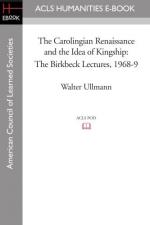|
This section contains 1,368 words (approx. 5 pages at 300 words per page) |

|
The reign of Charlemagne (768–814) ended the long period of cultural decay and intellectual stagnation that had begun over three centuries before with the barbarian invasions of Western Europe. Despite the disintegration of the Carolingian Empire under Charlemagne's successors, the cultural revival that he inspired continued until the Vikings put an end to it, and even then something of the achievement of the eighth and ninth centuries survived to foster the renaissance of the eleventh and twelfth centuries.
The "Carolingian Renaissance" was dominated by two practical interests, ecclesiastical reform and social progress. Since Charlemagne depended on churchmen to implement his educational policy, the religious motives and ecclesiastical achievements—liturgical reform, monastic renewal, advancement of clerical education—inevitably predominated. Literary sensibility and intellectual curiosity were not, however, wholly lacking in the churchmen of the age, and some charming poems and substantial doctrinal treatises remain to testify to their...
|
This section contains 1,368 words (approx. 5 pages at 300 words per page) |

|


